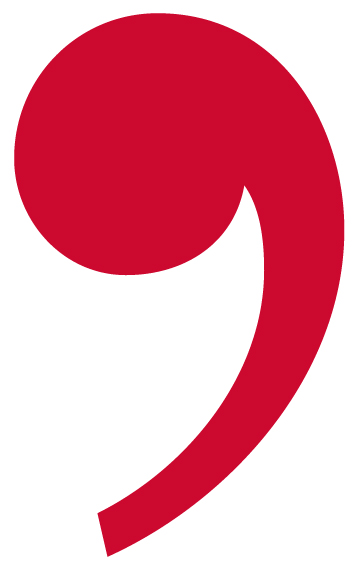You don't know comma grief, you say? It's a really common ailment among
writers. There are those who hardly use any at all. Case in point (which I'm making up--I don't have real examples): Hi Mary. No really. Bill do you think I should? I want butter pecan, vanilla and chocolate all in the same carton.
Yes, there should be a comma after Hi, a comma after No, a comma after Bill, and definitely, absolutely a comma after vanilla. That is of course the Oxford comma, which I use every chance I get and my editor allows...well, never.
You will note I didn't set of course aside with commas in the previous sentence, which I probably should have; however, I don't put the pause in there when I say it, so I don't put it in when I write it. You know which pause I mean, right? It's the one you hardly notice but you know is there.
Oh, but I'm digressing again, just as I always do. Could you make sense of what I said up there? A lot of people don't use nearly enough of them. Reading their work is very difficult for people like me, who probably use too many. (Too many doesn't include the Oxford comma, which is necessary.) Too many is in fact hard for me to illustrate because...well, it's just hard for me to believe there is such a thing.
That being said, there is the dealie with two independent clauses. It's one I see a lot...something like: I want to go to town, you can go with me. Don't you think that's just wrong? It needs to be two sentences, or at least have a semicolon (something that can get your hands slapped by an editor) or an em dash. I love em dashes--oh, and ellipses! I love them, too. Had you noticed?
Reading back over this, I discover that what I intended to be an informative little treatise on commas became something with no detectable direction that probably makes very little sense. But, hey, didn't you read what I said in the first paragraph? I have line edits--which honesty insists I admit I love doing--but making sense is out the window until they're done.



I love to Oxford comma as well, and believe it serves a valuable purpose. However, I've recently, read a few stories where they seem to, put commas, at very random places. It, makes reading very stilted, and frustrating. :-)
ReplyDeleteI know what you mean. It's as if the writer thinks s/he hasn't used one for awhile and tosses a few in there willy-nilly.
DeleteTHE OXFORD MUST STAY!!
ReplyDeleteAmen!
DeleteYou already know how I feel about commas, Oxford and otherwise, so suffice to say, your editor is wrong about the Oxford. Dunno about the others--I've never noticed that over-comma much... but then, I get so wrapped up in your amazing stories that I don't pay much attention to the commas, unless I'm editing. Then, I read for entertainment before I read for commas. ;-)
ReplyDeleteIn all fairness to my editor, it's not his fault--it's house rules. Thank you! I hope I read for entertainment first, too, but if a story is too poorly punctuated or grammar-ed, I get lost in all that flotsam and jetsam.
DeleteI like Oxford commas, too. I think they serve a purpose, and I like the way they look. But if house rules say they have to go, well, what can you do? It's not a fight you can win. Good luck with your line edits, Liz. Have fun!
ReplyDeleteI am. I got stuck this morning, though, and gave it up for a few hours. I know with one book I have, house rules state OK instead of okay--since I literally can't stand how OK looks in print, I went through the ms. and took almost all of them out. Maybe a little OCD? :-)
DeleteI was schooled with the Oxford commas, I think, but I go comma happy; I take out I put back, I trust my editor. Thank god!
ReplyDeleteI feel strongly about the Oxford comma--not so much some of the others. However, it's not one I can win, so I try to go with the editorial flow.
Delete